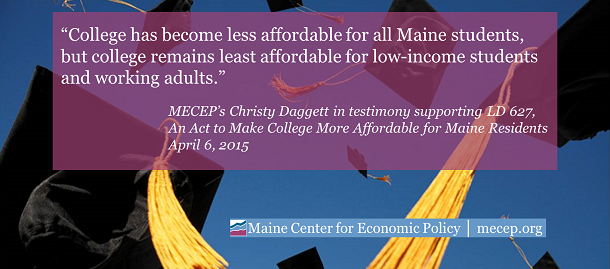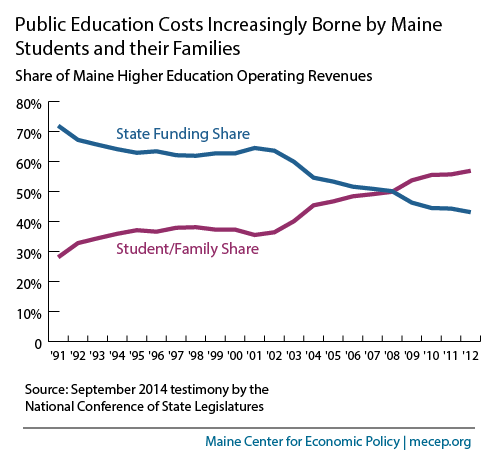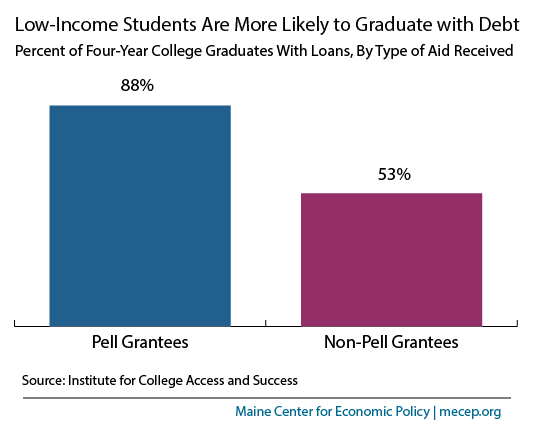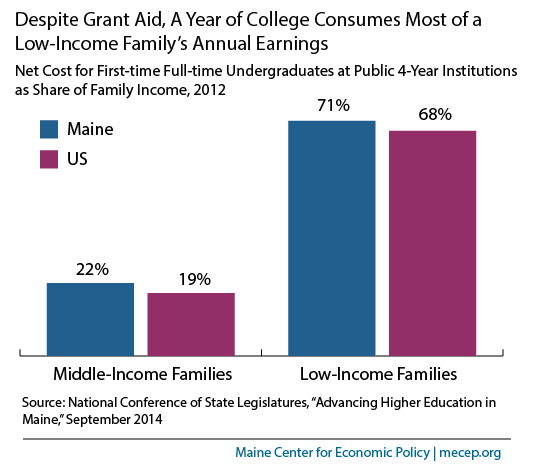“A good education opens the door to a good job for aspiring Maine workers, to future prosperity for them and their families, and to a strong Maine economy that attracts business investment,” said MECEP policy analyst Christy Daggett testified. “But the rising education costs, shrinking student aid, and crushing student loan debt are closing that door to far too many Mainers, especially those from low income families. College has become less affordable for all Maine students, but college remains least affordable for low-income students and working adults.”
 “Rising education costs, shrinking student aid, and crushing student loan debt are closing that door [to a good job] to far too many Mainers”
“Rising education costs, shrinking student aid, and crushing student loan debt are closing that door [to a good job] to far too many Mainers”
Augusta, Maine (Monday, April 6, 2015) The Maine Center for Economic Policy (MECEP) today released a new report, Maine’s Public College Affordability Crisis: It’s Worst for Families Earning the Least, on the rising costs for higher education in Maine. MECEP also testified today in support of LD 627, An Act to Make College More Affordable for Maine Residents, before the Maine legislature’s Joint Standing Committee on Education and Cultural Affairs.
 “A good education opens the door to a good job for aspiring Maine workers, to future prosperity for them and their families, and to a strong Maine economy that attracts business investment,” said MECEP policy analyst Christy Daggett testified. “But the rising education costs, shrinking student aid, and crushing student loan debt are closing that door to far too many Mainers, especially those from low income families. College has become less affordable for all Maine students, but college remains least affordable for low-income students and working adults.”
“A good education opens the door to a good job for aspiring Maine workers, to future prosperity for them and their families, and to a strong Maine economy that attracts business investment,” said MECEP policy analyst Christy Daggett testified. “But the rising education costs, shrinking student aid, and crushing student loan debt are closing that door to far too many Mainers, especially those from low income families. College has become less affordable for all Maine students, but college remains least affordable for low-income students and working adults.”
Daggett is the author of MECEP’s report which offers three recommendations to improve college affordability for Maine’s low-income and working adult students.
1. Expand the State of Maine Grant program to fund all of Maine’s neediest students at a rate of $5,500 per year.
2. Increase state appropriations for the University of Maine system to reduce the net cost of attending public college in Maine.
3. Improve funding to Maine Community College System to make the system more responsive to student and workforce demand.
 “Maine’s average student loan debt of $29,934 places the state 7th when ranking states by student debt load,” Daggett said. “Maine has the highest rate in New England of adults who have some college credit, but don’t have a degree and are stuck in low-paying jobs. Approximately 206,000 Mainers have some college, but no degree.”
“Maine’s average student loan debt of $29,934 places the state 7th when ranking states by student debt load,” Daggett said. “Maine has the highest rate in New England of adults who have some college credit, but don’t have a degree and are stuck in low-paying jobs. Approximately 206,000 Mainers have some college, but no degree.”
The MECEP report found that Maine’s public university system annual cost jumped from $11,958 in 2000 to $17,820 in 2013, and now consumes 71% of the annual earnings of a low-income family.
 For a copy of the report, Maine’s Public College Affordability Crisis: It’s Worst for Families Earning the Least, click here.
For a copy of the report, Maine’s Public College Affordability Crisis: It’s Worst for Families Earning the Least, click here.
For a copy of the report’s executive summary, click here.
To view MECEP’s testimony, click here.


